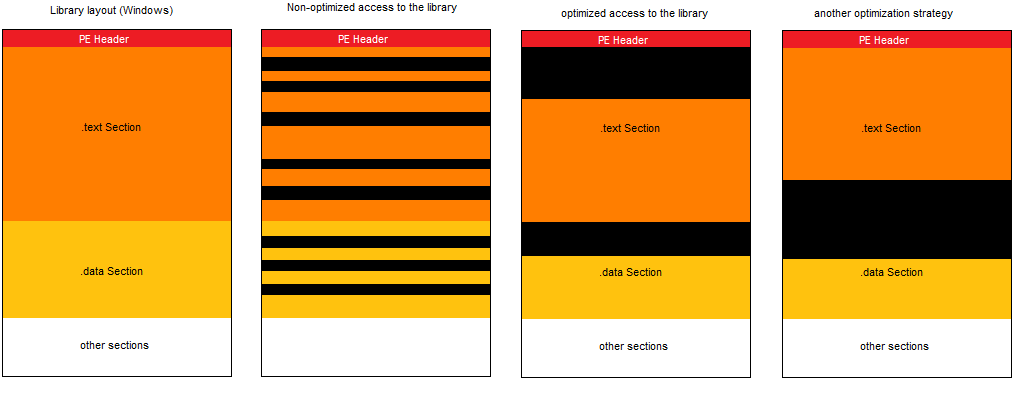Difference between revisions of "Performance/Reorder Symbols For Libraries"
(→Main idea) |
(→Main idea) |
||
| Line 4: | Line 4: | ||
== Main idea == | == Main idea == | ||
| + | |||
| + | Normally the compiler and linker produce a library which consists of many object files. The order of the code/data is dependent on the strategy of the linker and the layout of the library format. During the start up the application libraries are loaded on demand. Dependend on the program float new code and therefore pages are loaded from disk into memory. Unfortunately the linker doesn't know how the application accesses every library during the start up phase. Therefore the needed code/data is distributed all over the library which causes many page faults and disk access. | ||
[[Image:Main_Idea_Library_Optimization.png]] | [[Image:Main_Idea_Library_Optimization.png]] | ||
Revision as of 20:27, 22 March 2009
Reorder code/data for libraries to improve file I/O
The comprehensive analysis of the cold start up behavior of OpenOffice.org shows that file I/O is the main bottleneck. About 80% of the start up time is spent waiting for data from the disk. Most file I/O depends on library loading. This part describes what can be done to reduce I/O time for loading OpenOffice.org libraries. The main ideas are system independent but the solutions must be system/compiler specific. The following chapters describe in detail how we want to reorder code/data within the libraries.
Main idea
Normally the compiler and linker produce a library which consists of many object files. The order of the code/data is dependent on the strategy of the linker and the layout of the library format. During the start up the application libraries are loaded on demand. Dependend on the program float new code and therefore pages are loaded from disk into memory. Unfortunately the linker doesn't know how the application accesses every library during the start up phase. Therefore the needed code/data is distributed all over the library which causes many page faults and disk access.
System dependent solution
Windows
This chapter describes the solution for the Windows platform.
Microsoft Visual Studio 2008
OpenOffice.org uses the Microsoft Visual Studio 2008 C/C++ compiler suite for the Windows build, called wntmsci12[.pro]. What options are available to support us reordering code/data in libraries? If you start the C/C++ compiler and linker with the help option you can see all supported options. The following section shows the options which can help us.
Microsoft (R) 32-Bit C/C++-Optimizing Compiler Version 15.00.30729.01 for 80x86
Copyright (C) Microsoft Corporation. All rights reserved.
...
/Gh Enable _penter Hook Function
/GH Enable _pexit Hook Function
/Gy Enable Function-Level Linking
...
Microsoft (R) Incremental Linker Version 9.00.30729.01
Copyright (C) Microsoft Corporation. All rights reserved.
Syntax: LINK [Options] [Files] [@Commandfile]
Options:
...
/ORDER:@Filename
...Determine what functions are called during start up
How to create an ORDER file that is accepted by the linker
Linux
MacOS X
The following web page from Apple describes what must be done to reorder code/data of a library to improvde locality.
Solaris
OpenOffice.org uses the Sun Studio C++ compiler suite for building on both Sparc and x86 CPU systems. The following web page describes what can be done to optimize the code layout of libraries with the Sun Studio C++ compiler suite.
